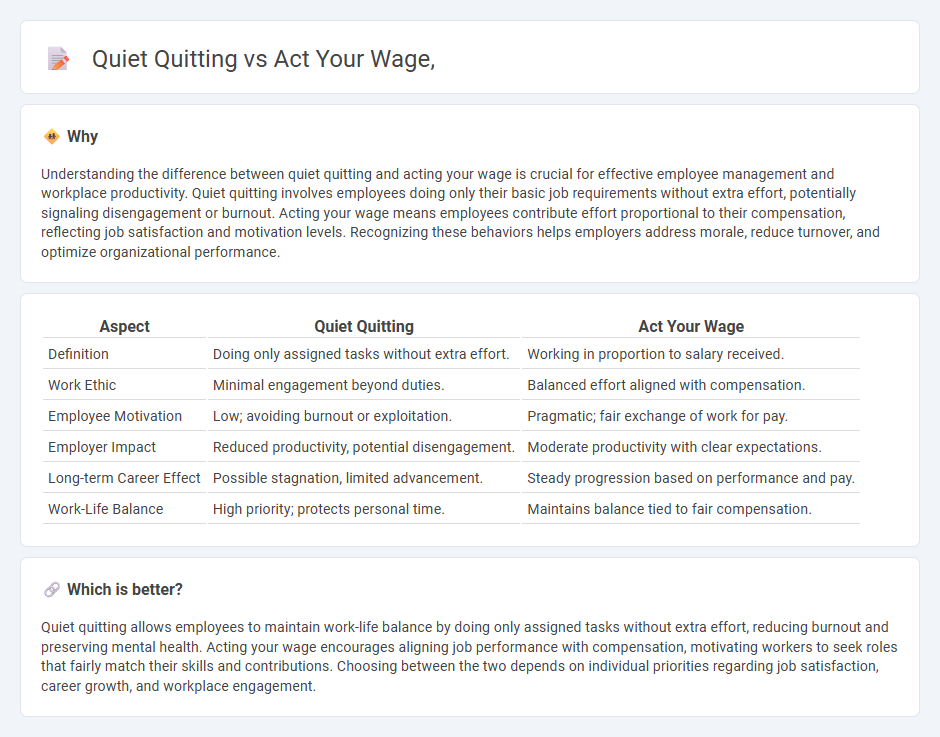
Quiet quitting, a growing workplace phenomenon, involves employees doing the minimum tasks required without extra effort, highlighting disengagement and unmet expectations. In contrast, the "Act Your Wage" mindset encourages workers to align their effort and ambition with their compensation level, fostering realistic productivity and satisfaction. Explore the impact of these contrasting approaches on career growth and organizational culture.
Why it is important
Understanding the difference between quiet quitting and acting your wage is crucial for effective employee management and workplace productivity. Quiet quitting involves employees doing only their basic job requirements without extra effort, potentially signaling disengagement or burnout. Acting your wage means employees contribute effort proportional to their compensation, reflecting job satisfaction and motivation levels. Recognizing these behaviors helps employers address morale, reduce turnover, and optimize organizational performance.
Comparison Table
| Aspect | Quiet Quitting | Act Your Wage |
|---|---|---|
| Definition | Doing only assigned tasks without extra effort. | Working in proportion to salary received. |
| Work Ethic | Minimal engagement beyond duties. | Balanced effort aligned with compensation. |
| Employee Motivation | Low; avoiding burnout or exploitation. | Pragmatic; fair exchange of work for pay. |
| Employer Impact | Reduced productivity, potential disengagement. | Moderate productivity with clear expectations. |
| Long-term Career Effect | Possible stagnation, limited advancement. | Steady progression based on performance and pay. |
| Work-Life Balance | High priority; protects personal time. | Maintains balance tied to fair compensation. |
Which is better?
Quiet quitting allows employees to maintain work-life balance by doing only assigned tasks without extra effort, reducing burnout and preserving mental health. Acting your wage encourages aligning job performance with compensation, motivating workers to seek roles that fairly match their skills and contributions. Choosing between the two depends on individual priorities regarding job satisfaction, career growth, and workplace engagement.
Connection
Quiet quitting and "act your wage" both reflect employees' responses to dissatisfaction with compensation and workload imbalance in the employment context. Quiet quitting involves doing the minimum job requirements without extra effort, signaling disengagement often linked to feeling undervalued or underpaid. The "act your wage" mindset promotes aligning work output strictly with salary, reinforcing boundaries that contribute to quiet quitting behaviors.
Key Terms
Boundaries
Acting your wage involves setting clear boundaries between effort and compensation, ensuring productivity aligns with fair pay. Quiet quitting emphasizes maintaining personal limits by disengaging from extra work beyond core responsibilities to prevent burnout. Explore strategies to balance workplace boundaries effectively and enhance job satisfaction.
Job expectations
Acting your wage involves aligning your work effort strictly with the compensation received, reflecting clear job expectations and fair remuneration. Quiet quitting, conversely, entails employees doing the bare minimum without officially resigning, often due to unmet expectations or burnout. Explore these dynamics further to understand how job satisfaction and performance intersect.
Work-life balance
Acting your wage involves aligning work efforts with compensation to maintain fairness and motivation, while quiet quitting emphasizes minimal work engagement to preserve personal time. Both concepts highlight the increasing focus on work-life balance, reflecting employees' desire to prioritize well-being over excessive job demands. Explore more about how these trends shape modern workplace dynamics and employee satisfaction.
Source and External Links
Acting Your Wage: Striking the Balance Between Work and Compensation - "Acting your wage" means performing only the tasks and duties for which you're compensated, setting boundaries to avoid overwork and maintain well-being without neglecting core responsibilities.
Why 'Act Your Wage' Is Scary - The phrase reflects a growing reluctance among employees, especially younger workers, to take on extra work without additional pay, signaling potential challenges in workforce motivation and engagement for employers.
What Does It Mean To Act Your Wage? Trend, Explained - "Act your wage" is about establishing personal boundaries at work--doing neither more nor less than what your compensation justifies, as a form of self-care and professional self-respect.
 dowidth.com
dowidth.com